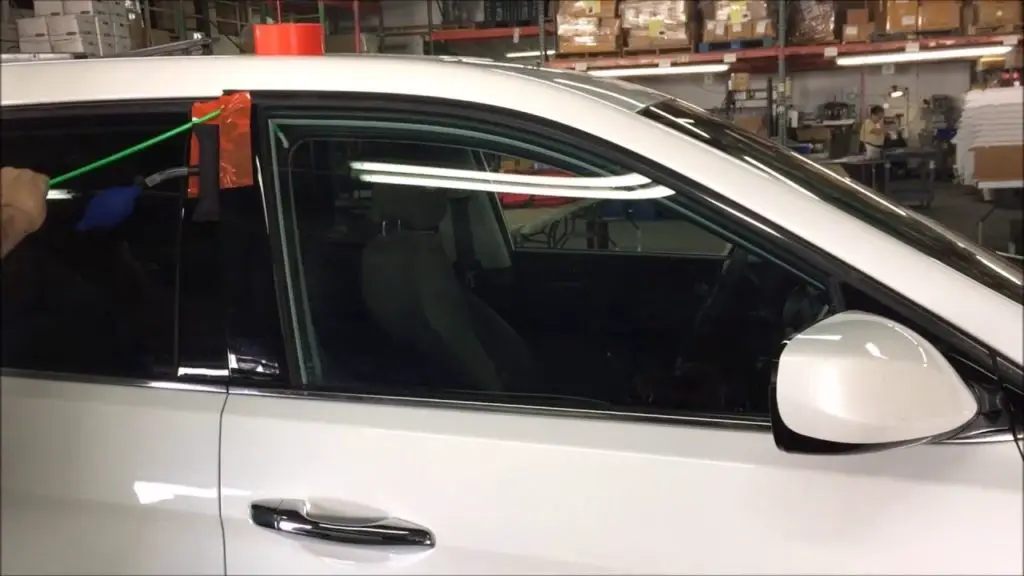Tires often sound like a helicopter due to uneven tread wear or faulty wheel bearings. These issues create a rhythmic noise while driving.
Tire noises can be alarming and indicate potential problems with your vehicle. Uneven tread wear usually results from improper alignment or unbalanced tires. Faulty wheel bearings can also cause similar sounds, leading to safety concerns. Regular maintenance and timely inspections help prevent these issues.
Addressing tire noises promptly ensures a smoother and safer driving experience. Proper care extends tire life and improves vehicle performance. Understanding the root cause of these sounds aids in quick resolution, saving time and money. Always consult a professional mechanic to diagnose and fix tire-related problems accurately.

Credit: m.youtube.com
Introduction To Tire Noise
Tire noise can be puzzling and alarming for drivers. Different noises often mean different issues. Helicopter-like sounds usually point to specific problems. Identifying the type of noise is the first step in solving the issue. Recognizing these sounds early can prevent bigger problems.
Differentiating Various Tire Noises
Understanding tire noises helps in diagnosing issues. Squealing often means hard braking or sharp turns. Thumping noises might indicate a flat spot on the tire. A helicopter sound may come from uneven tire wear. Paying attention to these sounds is crucial for safety.
When Tire Noise Signals A Problem
Persistent tire noise should not be ignored. It may signal a serious problem. Uneven wear can cause loud, helicopter-like noises. Checking tire alignment and balance is essential. Regular maintenance can prevent such issues. Always consult a professional if unsure.

Credit: www.glendalenissanla.com
Decoding The Helicopter Sound
Unusual tire noises often resemble a helicopter due to uneven tire wear or alignment issues. Identifying and addressing these problems ensures a smoother and quieter ride.
Characteristics Of The Chopper-like Hum
Helicopter sounds from your tires can be loud and annoying. The noise often occurs when driving at high speeds. It can also happen when turning corners. The sound is usually rhythmic and constant. It might get louder over time. This could mean your tires are wearing out. Uneven tire wear can cause this noise. It might also be due to a tire defect. Sometimes, the sound comes from the tread pattern. Tires with aggressive tread can make more noise.
Common Misconceptions About Tire Noises
Many think all tire noises mean a big problem. This is not always true. Some noises are normal for certain tires. Winter tires can make more noise than summer tires. New tires might be noisier at first. Not all noises mean your tires are bad. Regular checks can help you know if there’s an issue. Some people think tire noise only comes from the tires. Sometimes, noise can come from the suspension or the road surface. It’s good to check all parts of your car.
Factors Contributing To Tire Noise
Tire tread patterns can cause noise. Some patterns are louder than others. Wide and aggressive treads often make more noise. They can sound like a helicopter. Symmetrical treads are usually quieter. They make less noise on the road. Asymmetrical treads can be noisy, too. They have different patterns on each side. This can cause a helicopter-like sound.
Worn tires can produce more noise. Old tires lose their original shape. This can make them sound like a helicopter. Uneven wear is also a problem. It happens when tires are not balanced. They can make a thumping noise. Flat spots on tires are another issue. They occur when a car sits too long. Flat spots make tires noisy.
Wheel And Suspension Issues
Wheel bearings allow your tires to spin smoothly. Deterioration can cause a helicopter-like sound. This sound gets louder as you drive faster. Bad bearings may also cause vibrations in the steering wheel. Ignoring this issue can lead to serious damage.
The suspension system keeps your ride smooth. Worn-out suspension parts can cause strange noises. Helicopter-like sounds may arise from damaged shocks or struts. Regular checks can help avoid these problems. Timely replacements keep your car safe and quiet.
Alignment And Balance Troubles
Poor wheel alignment can cause tire noise. This noise often sounds like a helicopter. Misaligned wheels do not roll smoothly. This creates uneven tire wear. Uneven wear leads to more noise. The car may also pull to one side. This makes driving harder and less safe. Regular alignment checks can prevent these problems.
Imbalanced tires can cause vibrations. These vibrations create noise similar to a helicopter. The steering wheel may shake. This affects driving comfort and safety. Tires wear out faster when they are imbalanced. This leads to more frequent replacements. Balancing tires regularly can reduce these issues.
Credit: www.civicx.com
Road Conditions And Noise Correlation
Different road surfaces affect tire noise. Smooth asphalt roads create less noise. Rough concrete roads make tires sound louder. Gravel roads are even noisier. Tire noise depends on the pavement texture. Bumpy roads make tires sound like a helicopter. This happens because tires hit bumps and cracks. Smooth roads reduce this noise.
Debris on the road can cause tire noise. Sticks and stones can get stuck in tire treads. This makes a helicopter-like sound. Potholes and large cracks also cause noise. Tires make loud sounds when they hit these obstacles. Regularly checking tires can help prevent debris build-up. Keeping roads clean helps reduce tire noise.
Tire Maintenance For Noise Reduction
Regular tire inspections help keep your tires safe. Check for cracks, bulges, and wear. These issues can make your tires noisy. Look for foreign objects stuck in the treads. Remove stones or debris to reduce noise. Check tire pressure monthly. Proper pressure keeps your tires balanced and quiet. Inspect tread depth using a penny. Shallow treads can make your tires sound loud.
Rotate your tires every 5,000 to 8,000 miles. This helps even out the wear. Even wear reduces tire noise. Replace tires when the tread is low. Worn tires make more noise. Keep spare tires in good shape too. Balanced tires are quieter and safer.
Professional Diagnosis And Solutions
Contact a professional mechanic if your tires sound like a helicopter. They have the right tools to diagnose the issue. Mechanics can identify any tire damage or imbalance. They will check for wear and tear on your tires. Experts can also detect alignment problems that cause noise.
Mechanics use advanced diagnostic tools to find the problem. They may use a tire balancer to check balance. A wheel alignment machine ensures proper alignment. These tools help in accurate diagnosis. Professional mechanics can perform necessary repairs or replacements. They will ensure your tires are in optimal condition.
Preventive Measures And Best Practices
Picking the correct tires is crucial. Always check tire ratings. Look for tires designed to reduce noise. All-season tires often make less noise. Ensure tires are the right size for your vehicle. Premium tires usually offer better noise control. Read customer reviews before buying. Good tires can make your ride quieter.
Smooth driving helps reduce tire noise. Avoid sudden stops and starts. Stick to the speed limit. Regularly check tire pressure. Underinflated tires can be noisy. Rotate your tires every 6,000 miles. Balanced tires make less noise. Avoid rough roads when possible. Proper habits can keep your car quiet.
Conclusion: Ensuring A Quiet Ride
A quiet ride can be ensured by addressing tire issues that cause helicopter-like noises. Regular maintenance and proper tire selection play vital roles in noise reduction.
Summarizing Key Takeaways
Regular tire maintenance is crucial for a quiet ride. Check for uneven wear and ensure proper tire pressure. Wheel alignment should be checked periodically. Balanced tires prevent vibrations and noise. Replace worn-out tires on time to avoid issues.
Embracing The Silence Of Smooth Tires
Choose quality tires designed for quiet performance. Inspect your tires frequently for damage or debris. Rotate your tires regularly to ensure even wear. Avoid driving on rough terrains to maintain tire health. Keep your vehicle well-maintained for a smoother ride.
Frequently Asked Questions
Why Do My Car Tires Sound Like A Helicopter?
Your car tires may sound like a helicopter due to uneven tread wear, misalignment, or damaged wheel bearings. Check tire pressure and balance.
Why Does My Car Sound Like A Helicopter?
Your car may sound like a helicopter due to an exhaust leak, failing wheel bearings, or damaged CV joints.
Why Are My Tires So Loud All Of A Sudden?
Worn tread, uneven wear, or low tire pressure can cause loud tires. Check for damage or alignment issues too.
Why Does My Tire Sound Like An Airplane?
Your tire may sound like an airplane due to uneven tread wear, wheel alignment issues, or a damaged wheel bearing. Check for these problems and address them promptly to ensure safe driving.
Conclusion
Regular tire maintenance prevents unusual sounds like a helicopter. Check your tires for wear, alignment, and balance issues. Addressing these problems early ensures a smooth, quiet ride. Keep your tires in top condition for safety and comfort. Remember, attentive care saves money and extends tire life.
Prioritize your vehicle’s health today.

